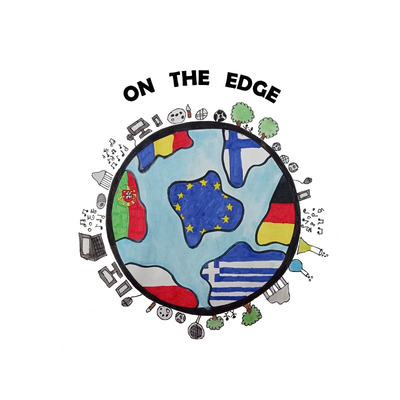
“On the edge” - ERASMUS+ project. 11-13 year old students will be shown the beauty of learning, intensify curiosity and broaden interests, increase their level of knowledge and skills by acknowledging all the interesting topics hidden in the school subjects through a broad range of subject areas and a hands-on approach.
By working in an international environment/teams (the foundation of this project), students will raise awareness of the rich cultural and social diversity within Europe and enrich their development in a way that’s impossible in the traditional classroom environment; students will increase the sense of self-confidence, develop social and literacy skills and learn a foreign language in a true situation of communication.
“On the edge” should bring to our minds the idea that beyond the edge there is a world with thousands of possibilities that Ss may benefit from. ‘The edge’ is ‘a door’ to the unknown, fascinating, full of curiosities world. The only thing students need to do is to open it!
LANGUAGES
Deutsch, ελληνικά, English, suomi, polski, português, română
AGE RANGE
From 10 to 14
SUBJECTS
Art, Biology, Chemistry, Citizenship, Environmental Education, Foreign Languages, Geography, History, Informatics / ICT, Language and Literature, Mathematics / Geometry, Media Education, Music, Natural Sciences, Physical Education, Physics, Primary School Subjects, Technology
WORK PROCESS
This project will support the already approved Erasmus+ project “On the edge” (2018-2020). We will have 6 international mobilities. Students will be working in international teams, having to perform activities and carry out tasks, thus earning points for their team. Each country has a specific theme connected to the school syllabus. Therefore, we have Portugal on the edge of Arts and Music (Nov 2018); Romania on the edge of Science and Maths (Feb 2019); Poland on the edge of Biology and Ecology (May 2019); Germany on the edge of Sports and Technology (Nov 2019); Finland on the edge of Nature and Culture (Feb 2020); and Greece on the edge of the European Cultural Heritage, with a special focus on Languages, History and traditions (May 2020). All the learning in this project will be contextualized and made relevant to life beyond the classroom. That’s why relating learning to real-life settings and the world of work is a central feature.
EXPECTED RESULTS
Our TwinSpace will be public. By organising students in international teams and having them working in an international environment, we want Ss to increase the sense of self confidence. By striving to communicate with their teammates, students will realise the importance of learning a foreign language. Having to overcome language barriers and cultural differences will increase their level of competence in foreign languages. They will mingle, compare themselves, find similarities, learn that difference is one of the EU’s richnesses. We expect them to create a network of international contacts and gain a more positive attitude towards the European project and the EU values. Straightening these ties is of the utmost importance nowadays. Teachers will work closely, observing and disseminating good practice, gaining a deeper understanding of other school systems. We hope to inspire other students and teachers to jump out of books and break the boundaries of knowledge!
BACK
NEXT